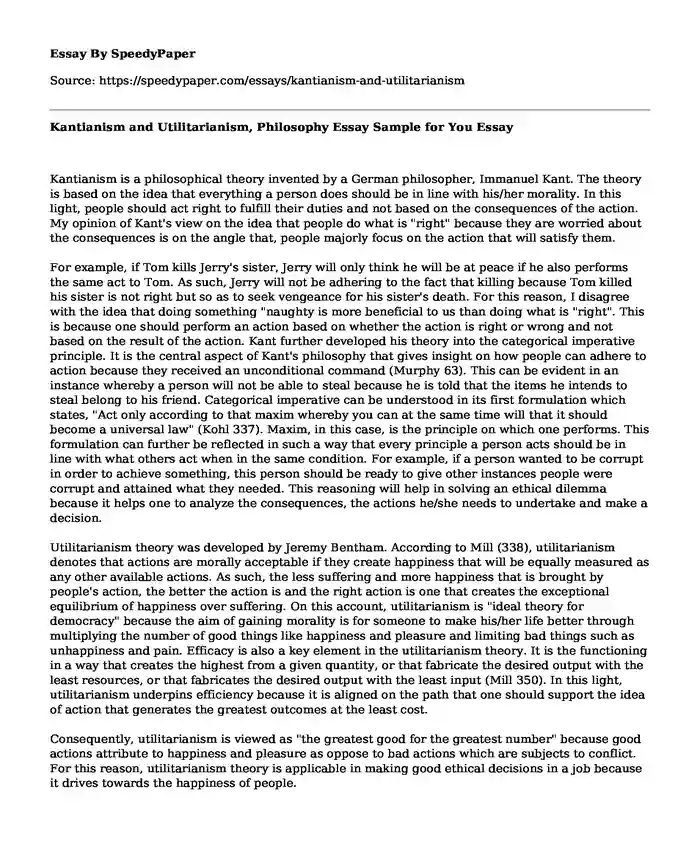
| Type of paper: | Essay |
| Categories: | Philosophers Immanuel Kant |
| Pages: | 3 |
| Wordcount: | 671 words |
Kantianism is a philosophical theory invented by a German philosopher, Immanuel Kant. The theory is based on the idea that everything a person does should be in line with his/her morality. In this light, people should act right to fulfill their duties and not based on the consequences of the action. My opinion of Kant's view on the idea that people do what is "right" because they are worried about the consequences is on the angle that, people majorly focus on the action that will satisfy them.
For example, if Tom kills Jerry's sister, Jerry will only think he will be at peace if he also performs the same act to Tom. As such, Jerry will not be adhering to the fact that killing because Tom killed his sister is not right but so as to seek vengeance for his sister's death. For this reason, I disagree with the idea that doing something "naughty is more beneficial to us than doing what is "right". This is because one should perform an action based on whether the action is right or wrong and not based on the result of the action. Kant further developed his theory into the categorical imperative principle. It is the central aspect of Kant's philosophy that gives insight on how people can adhere to action because they received an unconditional command (Murphy 63). This can be evident in an instance whereby a person will not be able to steal because he is told that the items he intends to steal belong to his friend. Categorical imperative can be understood in its first formulation which states, "Act only according to that maxim whereby you can at the same time will that it should become a universal law" (Kohl 337). Maxim, in this case, is the principle on which one performs. This formulation can further be reflected in such a way that every principle a person acts should be in line with what others act when in the same condition. For example, if a person wanted to be corrupt in order to achieve something, this person should be ready to give other instances people were corrupt and attained what they needed. This reasoning will help in solving an ethical dilemma because it helps one to analyze the consequences, the actions he/she needs to undertake and make a decision.
Utilitarianism theory was developed by Jeremy Bentham. According to Mill (338), utilitarianism denotes that actions are morally acceptable if they create happiness that will be equally measured as any other available actions. As such, the less suffering and more happiness that is brought by people's action, the better the action is and the right action is one that creates the exceptional equilibrium of happiness over suffering. On this account, utilitarianism is "ideal theory for democracy" because the aim of gaining morality is for someone to make his/her life better through multiplying the number of good things like happiness and pleasure and limiting bad things such as unhappiness and pain. Efficacy is also a key element in the utilitarianism theory. It is the functioning in a way that creates the highest from a given quantity, or that fabricate the desired output with the least resources, or that fabricates the desired output with the least input (Mill 350). In this light, utilitarianism underpins efficiency because it is aligned on the path that one should support the idea of action that generates the greatest outcomes at the least cost.
Consequently, utilitarianism is viewed as "the greatest good for the greatest number" because good actions attribute to happiness and pleasure as oppose to bad actions which are subjects to conflict. For this reason, utilitarianism theory is applicable in making good ethical decisions in a job because it drives towards the happiness of people.
References
Kohl, Markus. "Kant on determinism and the categorical imperative." Ethics 125.2 (2015): 331-356.
Murphy, Susan P. "Contemporary Philosophical Faces of Deontology and Consequentialism-John Rawls and Peter Singer." Responsibility in an Interconnected World. Springer, Cham, 2016. 61-87.
Mill, John Stuart. "Utilitarianism." Seven Masterpieces of Philosophy. Routledge, 2016. 337-383.
Cite this page
Kantianism and Utilitarianism, Philosophy Essay Sample for You. (2022, Feb 23). Retrieved from https://speedypaper.net/essays/kantianism-and-utilitarianism
Request Removal
If you are the original author of this essay and no longer wish to have it published on the SpeedyPaper website, please click below to request its removal:
- Talking To Grief By Denise Levertov: Essay Sample to Check
- Free Essay Example on the Role of Religion in the Abolition Movement
- Free Essay Comprising a Participant Observation of a Subculture - Music Producers
- World Literature Essay Example Contrasting Hector and Achilles
- Start a Sewing Business: A Budget List of Purchases
- Essay Sample: Management Approaches for the Aviation Industry
- Free Essay. The Roles of Language and Literature in the Process of Colonization-Robinson Crusoe
Popular categories




